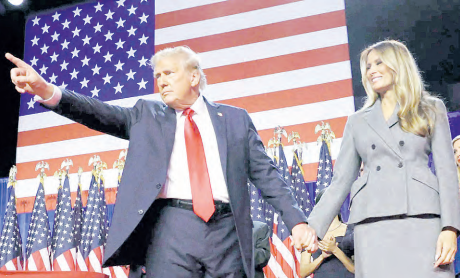

Kenya is confident the negotiations on the Strategic Trade and Investment Partnership (STIP) will continue to fruition despite change of leadership at the White House following the just concluded US elections.
The negotiations that entered the eighth round in September slowed down as the US went into last week’s elections, where former President Donald Trump won after beating US vice President Kamala Harris in the race.
Trump is now expected to take over from Joe Biden in January next year. Previous changes in office both in the US and Kenya have stalled the trade deal whose talks commenced in July 2020 during Trump and Uhuru Kenyatta’s tenures.
After the US elections in November 2020, President Biden’s administration took time to review part of the pact before initiating a fresh round of talks.
Kenya then went into an election in August 2022, which saw then Deputy President William Ruto ascend to power, with his administration taking over the negotiations.
Ruto and Biden’s administrations then settled to seek a deal under what is now known a Strategic Trade and Investment Partnership (STIP).
A return of Trump in the Oval could however lead to another review of the deal, trade experts have indicated. However, Trade PS Alfred K’Ombudo who has been leading the Kenyan team in the negotiations has however indicated that the change in office will not hurt the process.
According to the PS, Kenya and the United States of America have a long-standing trade, investment and development cooperation relationship that is based on common and enduring principles.
“Our conversations with the United States as AGOA senior officials and ministers and with Kenya, show broad based, bi—partisan and bicameral support for advancing trade and investment between the Africa, Kenya and the United States. This transcends administrations both in the U.S. and Kenya,” K’Ombudo noted.
US ambassador Meg Whitman had earlier indicated the two countries were keen to have a deal before a new administration, in what will be one of President Joe Biden’s achievements on strengthening bilateral ties with its key ally in East Africa.
“I really hope we can bring it to fruition by end of this year,” Whitman had said in Nairobi.
According to the ambassador, a deal can also be sealed during the ‘lame duck’ period. This is the period between after elections (November) and handing over of power to the elected President, which is normally January 20 of the year following the election.
With a bilateral deal, Kenya is keen to tap at least five per cent of the US market, which has the potential to earn the country more than Sh2 trillion in export revenues annually.
Last year, Kenya’s exports to the US were valued at Sh62.3 billion, down from Sh79.9 billion, the Economic Survey 2024 indicates.
More than half of Kenyan exports to the US are comprised of textile and apparel, macadamia, coffee, titanium ores and concentrates, and black tea.
Trade is however in favour of the
US as Kenya spent Sh112.8 billion
on imports from the US market, an
increase from Sh93.4 billion in 2022.












